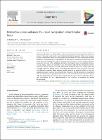| dc.contributor.author | NEWELL, FIONA | en |
| dc.contributor.author | NEWELL, FIONA | en |
| dc.date.accessioned | 2015-12-09T12:27:11Z | |
| dc.date.available | 2015-12-09T12:27:11Z | |
| dc.date.issued | 2015 | en |
| dc.date.submitted | 2015 | en |
| dc.identifier.citation | Bulthoff, I., & Newell, F.N., Distinctive voices, not arbitrary sounds, enhance the visual recognition of faces, Cognition, 137, 2015, 9-21- | en |
| dc.identifier.other | Y | en |
| dc.identifier.uri | http://hdl.handle.net/2262/75207 | |
| dc.description | PUBLISHED | en |
| dc.description.abstract | Several studies have provided evidence in favour of a norm-based representation of faces in memory. However, such models have hitherto failed to take account of how other person-relevant information affects face recognition performance. Here we investigated whether distinctive or typical auditory stimuli affect the subsequent recognition of previously unfamiliar faces and whether the type of auditory stimulus matters. In this study participants learned to associate either unfamiliar distinctive and typical voices or unfamiliar distinctive and typical sounds to unfamiliar faces. The results indicated that recognition performance was better to faces previously paired with distinctive than with typical voices but we failed to find any benefit on face recognition when the faces were previously associated with distinctive sounds. These findings possibly point to an expertise effect, as faces are usually associated to voices. More importantly, it suggests that the memory for visual faces can be modified by the perceptual quality of related vocal information and more specifically that facial distinctiveness can be of a multi-sensory nature. These results have important implications for our understanding of the structure of memory for person identification | en |
| dc.description.sponsorship | We thank Daniel Berger for help creating the auditory stimuli, Franziska Hausmann, Karin Bierig, Saskia Kühnhold and Silke Wittkowski for help in programming the experiments and testing participants, and Corrina Maguinness for help with data analyses. We are grateful to our colleagues for allowing us to record their voices for use as stimuli. This research was supported by the Max Planck Society and by funding from Science Foundation Ireland (Grant No. 10/IN.1/I3003) awarded to FNN. | en |
| dc.format.extent | 9-21 | en |
| dc.relation.ispartofseries | Cognition | en |
| dc.relation.ispartofseries | 137 | en |
| dc.rights | N | en |
| dc.subject | Audio-visual; Distinctiveness; Face recognition; Multisensory; Voices | en |
| dc.subject.lcsh | Audio-visual; Distinctiveness; Face recognition; Multisensory; Voices | en |
| dc.title | Distinctive voices, not arbitrary sounds, enhance the visual recognition of faces | en |
| dc.type | Journal Article | en |
| dc.type.supercollection | scholarly_publications | en |
| dc.type.supercollection | refereed_publications | en |
| dc.identifier.peoplefinderurl | http://people.tcd.ie/fnewell | en |
| dc.identifier.rssinternalid | 56098 | en |
| dc.identifier.doi | http://dx.doi.org/10.1016/j.cognition.2014.12.006 | en |
| dc.rights.ecaccessrights | openAccess | |
| dc.subject.TCDTheme | Neuroscience | en |
| dc.contributor.sponsor | Science Foundation Ireland (SFI) | en |
| dc.contributor.sponsorGrantNumber | 10/IN.1/I3003 | en |




